Share
Working at ESO
Are you interested in working in areas of frontline technology and in a stimulating international environment? Do you feel your profile matches our requirements? Learn more about our current vacancies and apply online. Read more..
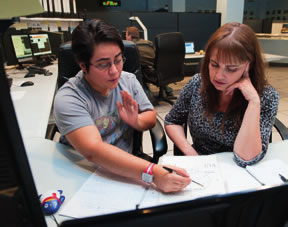
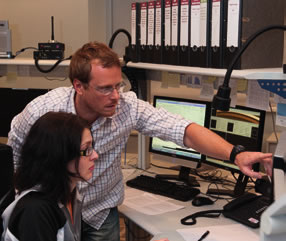

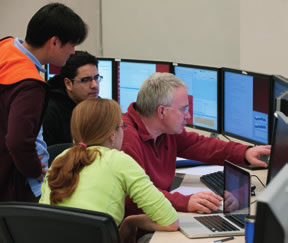
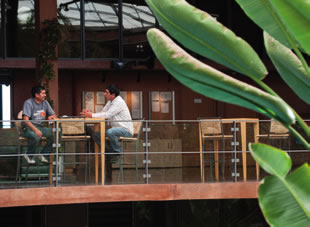

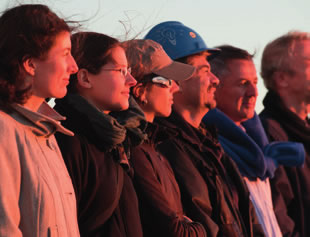
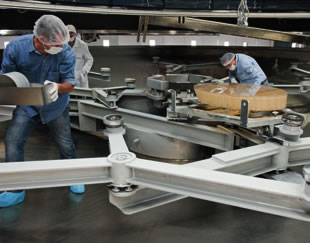
The European Organisation for Astronomical Research in the Southern Hemisphere (ESO) is the foremost intergovernmental astronomy organisation in Europe and the world's most productive ground-based astronomical observatory. ESO carries out an ambitious programme focused on the design, construction and operation of powerful ground-based observing facilities enabling astronomers to make important scientific discoveries.
ESO operates three unique world-class observing sites in northern Chile: La Silla, Paranal and Chajnantor (home to ALMA and APEX), and the ESO Headquarters are located in Garching, near Munich, Germany.
At Paranal, ESO operates the Very Large Telescope, the world's most advanced visible-light astronomical observatory, and will host and operate the southern array of the Cherenkov Telescope Array, the world's largest and most sensitive high energy gamma-ray observatory. ESO is a major partner in ALMA, the largest astronomical project in existence. And on Cerro Armazones, ESO is building the 39-metre Extremely Large Telescope (ELT), which will become "the world's biggest eye on the sky" and whose operations will be fully integrated into the Paranal Observatory.
For its Directorate for Science ESO is seeking a
European ALMA Programme Scientist
Garching
Deadline 22/04/2022
The European ALMA Programme Scientist serves as the primary contact between the ALMA Observatory, the European ALMA Support Centre and the European astronomical community with respect to the scientific capabilities, mission and exploitation of the ALMA facility.
S/he is responsible for ensuring that the European share of the observatory and its future development will enable ALMA to meet the scientific requirements. S/he monitors the scientific performance of ALMA operations and its compliance to what is required to carry out forefront science.
S/he fosters high-level participation of the community to identify emergent areas of astronomical research and help promote their rapid development. This includes identifying strategies for the best scientific use through the development plan.
Together with the ALMA Observatory Scientist, the North American and East Asian Programme Scientists, s/he:
- is a member of the Integrated Science Team (see ALMA Management https://www.almaobservatory.org/en/about-alma/the-people/alma-management/);
- helps to set scientific requirements and specifications for ALMA;
- reviews and monitors compliance with the scientific requirements and technical specifications in the various discipline areas.
Main Duties and Responsibilities:
- Foster a high level of participation by the ALMA community;
- Organise workshops; support the European ALMA Regional Centre activities in disseminating information on ALMA and present ALMA in talks at conferences/institutes;
- Provide scientific guidance to ALMA operations in Europe through the European ALMA Support Centre (EASC) in coordination with the ALMA partners;
- Participate in the management of the EASC as a member of its management team, maintain scientific coordination on the development plan with the other ALMA partners, cultivate the strong relationship with the Joint ALMA Observatory (JAO) necessary to influence its activities and priorities, and provide high-level European input to the scientific priorities of the ALMA development plan;
- Contribute to the development of the overall EASC policy, support the definition and execution of ESO internal ALMA development projects;
- Organise the European Scientific Advisory Committee (ESAC) and its meetings. ESAC is a sub-committee of ESO's Science and Technology Committee (STC), advising the ESO Council and ESO Director General. Organise ESAC teleconferences, as needed, ensuring ESAC face-to-face meetings are as effective as possible, delivering necessary documentation on time ahead of the meetings and contributing to the STC meetings;
- Support the European members of ALMA Science Advisory Committee (ASAC), and support the STC as needed by the ESO Director for Science;
- Coordinate the ALMA Project Scientist at ESO, according to ESO's scientific priorities;
- Work as part of the ALMA Integrated Science Team, with the Observatory Scientist at JAO, to update and maintain the top-level ALMA science requirements;
- Advise the ESO Communications Department, alongside the Programme Scientists for VLT, VLTI and ELT, on the scientific merit of proposed press releases;
- Play an active role in ESO and the Directorate for Science (DSC), mentoring the Students and Fellows and helping provide an environment in which science and scientists can thrive; attend regularly and actively participate in various science meetings and in DSC group meetings; and
- Take on budget responsibility for a Directorate for Science-specific Work Package.
As a member of the ESO Astronomy Faculty, the European ALMA Programme Scientist is expected and encouraged to conduct a world class research programme and is encouraged to foster collaborations within the Munich broader research area.
Reports to:
Director for Science, in coordination with the Head of the European ALMA Support Centre.
Key Competences and Experience
Essential Competences and Experience:
- Outstanding scientific record, based on an extensive use of sub-mm resources, allowing him/her to develop and formulate a scientific vision for ALMA;
- Excellent leadership qualities, inspiring the community and ALMA Partners to support ALMA as a prime astronomical facility;
- Outstanding teamwork skills allowing him/her to work closely with the key stakeholders across the ALMA programme (in particular with the other ALMA Programme Scientists, the oversight and advisory committees, as well as the ESO and JAO leadership) and with the other ESO Programme Scientists for the greater good (and interaction) of ESO facilities;
- Expresses self in a clear, concise and structured manner;
- Able to set aside individual needs in support of the strategic and operational needs of ESO;
- Able to constructively suggest improvements to established ways of working to create positive change;
- Proposes original ideas and creative options; thinks "outside the box";
- Delivers work on time and to required standards, optimising resources as necessary and in line with budget;
- Outstanding communication and diplomatic skills, allowing to effectively communicate at all levels within the ALMA partnership and with the community;
- A strong record of personal research, demonstrating international recognition in submillimetre related research.
Desirable Competences and Experience:
- Experience as project scientist, project lead or equivalent within sub-mm scientific programmes or projects;
- Contributions to facility oversight and/or advisory structures;
- Experience in community liaison and/or community leadership.
Qualifications:
Ph.D. in astronomy, physics or equivalent.
Language skills:
The position requires an excellent command of the English language, both oral and written. Additional knowledge of Spanish and/or other European languages would be an advantage.
Remuneration and Contract:
We offer an attractive remuneration package including a competitive salary (income-tax free), comprehensive pension scheme and medical, educational and other social benefits, as well as financial help in relocating your family and the possibility to place your child/children in day-care.
The contract is for a fixed term duration of three years and is subject to successful completion of the probation period. There may be a possibility of extension(s) subject to individual performance and organisational requirements, and as defined in the applicable policies, staff rules and regulations, and the ESO Astronomy Charter. For any further information, please visit ESO's conditions of employment (https://www.eso.org/public/jobs/conditions/intstaff/). Please note that the contract policy and in particular the regulations concerning fixed-term and indefinite contracts are currently under review which may lead to changes in the contractual conditions applicable to this position.
Starting Date:
As soon as possible.
Duty Station:
Garching near Munich, Germany, with regular duty trips to ESO sites in Chile; a duty station in Santiago, Chile is also a possibility.
Career Path: VI
Application:
If you are interested in working in areas of frontline technology and in a stimulating international environment, please visit (http://www.eso.org) for further details.
Applicants are invited to apply online at http://jobs.eso.org/. Applications must be completed in English and should include a motivation letter and a CV containing a publication list with a research statement. Also required are the names and contact details of three scientists familiar with your work and willing to provide a recommendation letter. Referees will be automatically invited to submit a recommendation letter. However, applicants are strongly advised to trigger these invitations (using the web application form) well in advance of the application deadline.
Closing date for applications is 22 April 2022.
ESO has established diversity as an important value of the Organisation, is committed to providing an equal opportunities environment and is actively seeking to promote a diverse and inclusive workforce.
No nationality is in principle excluded, however, recruitment preference will be given to nationals of Australia, Austria, Belgium, the Czech Republic, Denmark, Finland, France, Germany, Ireland, Italy, the Netherlands, Poland, Portugal, Spain, Sweden, Switzerland, the United Kingdom and Chile irrespective of gender, age, disability, sexual orientation, ethnicity or religion.
